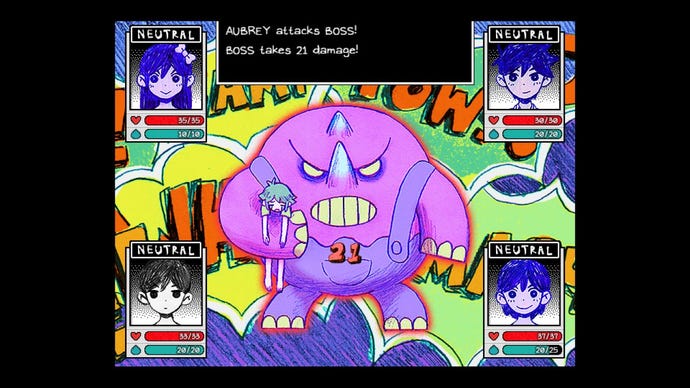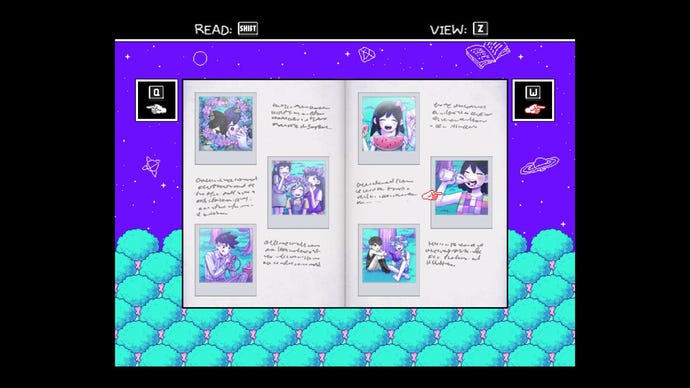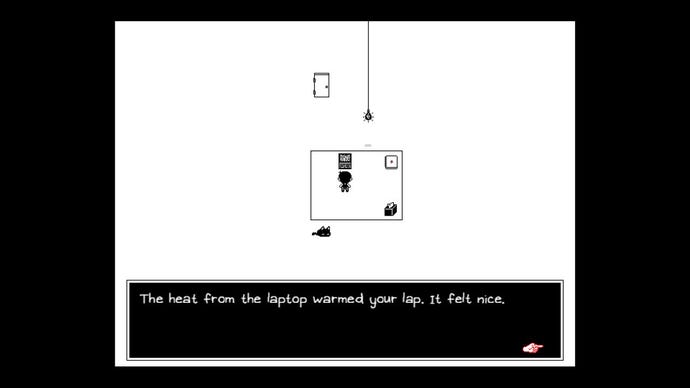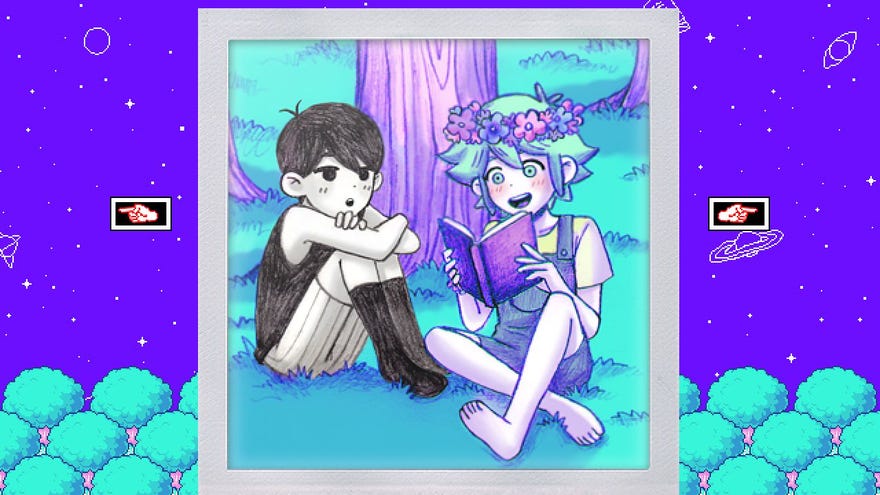Omori review
Look at this photograph
Last year, as the pandemic dragged on through the sweltering summer months, my cat unexpectedly died. I got the call on the way home from a rare visit with a friend, where we had sat six feet apart with masks on as we watched Hamilton. The next thing I knew I was at the vet, saying goodbye to my sweet boy as I held him for the last time. It was only a few months later, when one of the hundreds of photos that I had taken of my cat popped on my phone, that I genuinely broke down. Humans can be very good at repressing the grief that arises from traumatic memories, but photos have a powerful way of taking one back to a particular time and place. I saw myself holding my cat tight, and I cried.
The story of Omori, a small RPG with a fervent fanbase released in the last few days of 2020, is built on such moments. Based on an independent manga of the same name, Omori is the story of a silent teenager who spends most of his time exploring elaborate retrowave fantasy worlds. When he’s not battling household objects or gators wearing sunglasses, he inhabits a blank room known only as “White Space” that contains his laptop, a black lightbulb, a box of tissues, and an extremely disturbing sketchbook.
Crafted in the style of gonzo RPGs like Earthbound, Omori vacillates wildly between a kind of wholesome strangeness and grim psychological horror. It spends the duration of its roughly 20 hours slowly unwinding a shocking event that leaves a trail of grief, repression, and broken friendships in its wake. How the eponymous protagonist, also named Sunny, chooses to deal with this trauma sits at the crux of its story.
Omori hits at a very particular time for me. I’ve spent much of the pandemic unpacking long-standing grief, reexamining old feelings, and processing my emotions with those closest to me. Nearly eleven months of lockdown will do that. So while Sunny’s journey doesn’t read as especially new - how many indie games are about unpacking trauma? - it does resonate with me. It helps that it attacks its subject matter with a verve that goes above and beyond games of this type, with standout art resembling that of a sketchbook come to life.

This art finds its fullest expression in its battle system, which superficially resembles the turn-based combat found in the 16-bit RPGs of yesteryear, but differentiates itself by weaving in extra elements that tie in neatly with the story. Set in a first-person perspective, it finds Omori (or Sunny) battling a mix of punny monsters, school bullies, and random office equipment. The attacks are generally pretty simple, but it can occasionally be surprisingly well-animated for a game of this type, featuring anime-style cut-ins that help to punctuate its strongest moments.
"Omori takes a story that might have come off as trite or even insensitive in the wrong hands and imbues it with a memorable darkness."
Its rock-paper-scissors strategy revolves around emotions, with sadness beating happiness, happiness beating anger, and anger beating sadness. Each emotional state brings with it particular stat boosts, and it’s possible to escalate from being simply happy to a state of manic excitement. Omori / Sunny is particularly disturbing in such moments, his eyes becoming empty white orbs as he grins maliciously at the camera. Omori has a way of taking what should be a positive or sweet moment and making it seem vaguely horrifying, which fits in well with its idea of a bright fantasy world masking a terrible reality beneath.
Omori is admittedly at its most conventional in these fantasy worlds, its flow a familiar mix of combat, puzzle-solving, and exploration in the mold of retro Japanese RPGs. Omori / Sunny can slash obstacles using his knife, his friend Aubrey - a tough girl wielding a baseball - can slice them, and so forth. It picks up during the often difficult boss battles, which challenge you to properly lean on the strengths and weaknesses of the various emotions, and to properly use party assists for immediate heals and group attacks.
I found that whenever my attention began to flag during the (mercifully short) dungeons, these fights against space pirates and giant worms were usually enough to regain my interest. The same could be said for the mystery of what exactly happened to Sunny, Basil, Hero, Aubrey, and Kel - a formerly tight-knit group of friends undone by tragedy. The mystery hovers around the edges for much of the story, usually in the shape of a shifting black monster that will vanish on approach, abruptly taking center stage right when you least expect it.

Much of the mystery is centered on a photo album that crops up throughout the story. Initially presented as a source of warm nostalgia and joy, it morphs into a talisman of sadness, then something else entirely. Photos are a recurring motif throughout Omori, a physical reminder of the past that everyone is trying to leave behind. When switching between party members, a quick polaroid appears, a funny moment that is nevertheless tinged with a vague sort of sadness. One of the story’s climactic moments also involves photos, which is presented in a way that feels horrifying despite showing very little.
These days, few people trouble to build actual photo albums, unless they are doing so as a crafts project. Instead, photos will pop up unbidden on phones and social media feeds, blindsiding you with an unexpected blast of nostalgia or grief. A couple years ago, my phone started showing me a wave of photos from 2014, unintentionally surfacing a particularly painful period in my life. The random photo of a sushi chef prepping my dinner was innocuous enough, but it hurt to think about why I was sitting alone in that restaurant on that particular night.
Thankfully, I’m doing a bit better these days, but only after a significant amount of work. As for how Omori / Sunny deals with his grief, that’s up to you. In the way that only a well-made RPG can really manage, it presents choices that aren’t always obvious in the moment, but become significant later on. Even the simple act of choosing whether to answer the door is an important choice that can send the story spinning in a totally different direction.

Owing to its unconventional release date, Omori hasn’t really been on the mainstream radar, but I came away impressed. It takes a story that might have come off as trite or even insensitive in the wrong hands and imbues it with a memorable darkness, aided by a tight combat system and some outstanding artwork. If you’re in a bad place - and lord knows many of us are - Omori might not be the game for you right now, as it goes in some intense places. But neither should you let this dark tale of a childhood lost slip away. Bleak as it might be, it may be one of the year’s most memorable RPGs.


